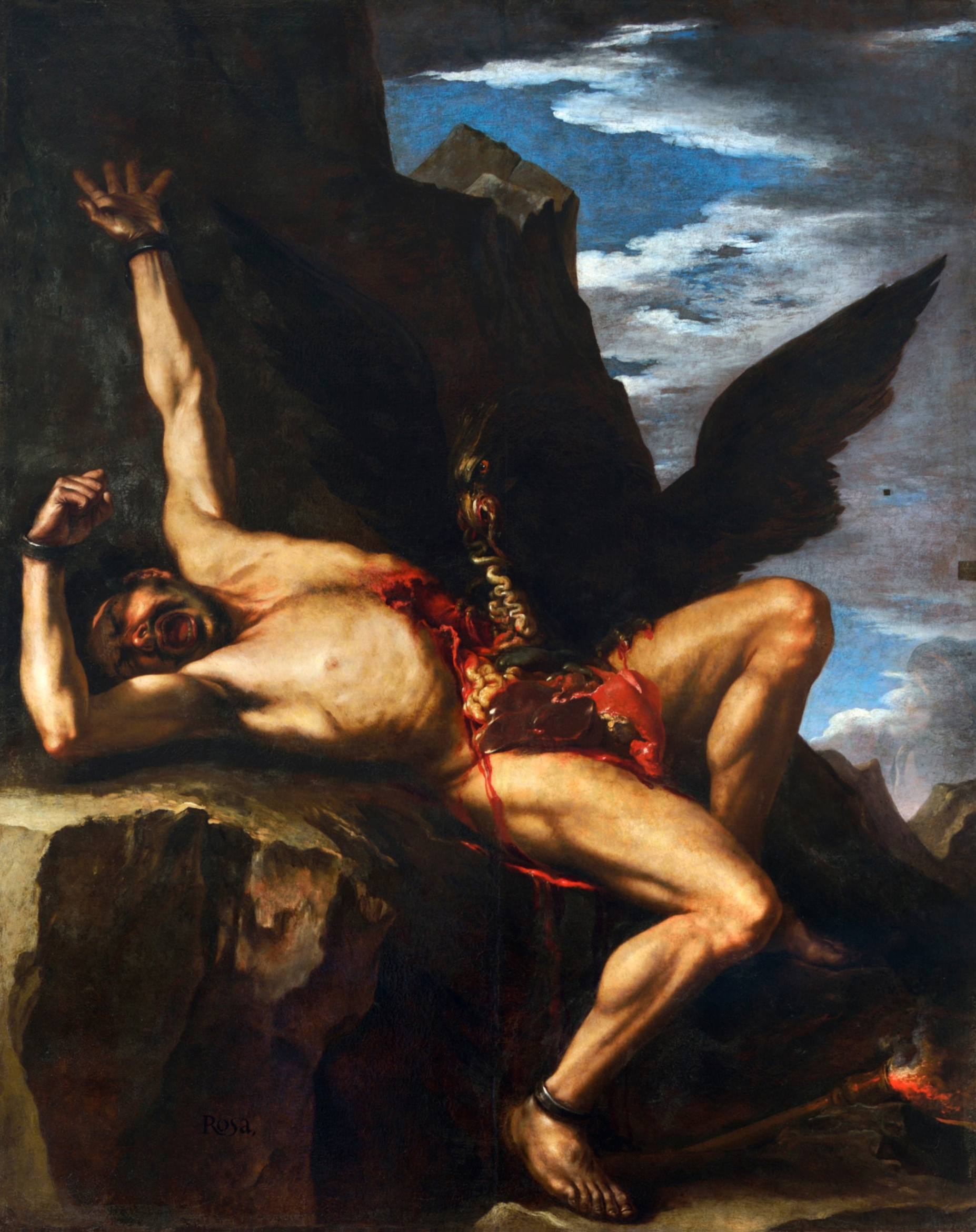On the one hand the fire represents the Logos, but on the other Prometheus embodies the wild nature of ancient cosmology, as opposed to the rationalization implemented by the society of the polis on the world outside the Hellenic civilization considered "barbaric" and irrational. The very sense of the tragic is based exactly on the sphere of non-rationality, on the mythical representation of the unconscious shadows of the Greek population of the polis and of man himself.
di Samuel Baricchi
Revision by Marco Maculotti.
COVER: GREGORIO MARTINEZ, “PROMETHEUS BOUND”, 1590-98.
Il Prometheus Bound it is a tragedy attributed to the Greek author Aeschylus, probably staged around 460 BC We know very little about the other two parts of the trilogy Prometheus released e Prometheus the bearer of fire, and in what order they were represented. In the Prometheus Bound we see Hephaestus, the Power (Kratos) and the Force (Bià), drag the titan in chains, to chain him to a rock on a mountain in the Scythia region.
Prometheus disobeys a very specific order from Zeus, the father of the new Olympic gods. As inOrestea of Aeschylus we see here another comparison between old and new generation, between a titan and Zeus, who with the help of the other Olympians defeated the titans, giants and wild creatures that ruled the world before the cosmic demiurgic rationalization carried out by the Olympic patriarch .
Prometheus bring fire to men, giving it to them. There discovery of fire represents an evolutionary turning point for humanity: according to the Greek tradition it is attributed to mythical origins, even going back to the work of a titan, incarnation and symbol of the elements of mother earth. Fire, in fact, rages in the sky through storms, assuming a transcendent and unattainable, vertical value, transferring, through the theft of the titan, to the sphere of the tangible and of what can be manipulated, used, preserved for practical purposes. Men started theirs evolutionary process also through the discovery and use of fire, to cook the meat of prey, and to defend itself from predators.
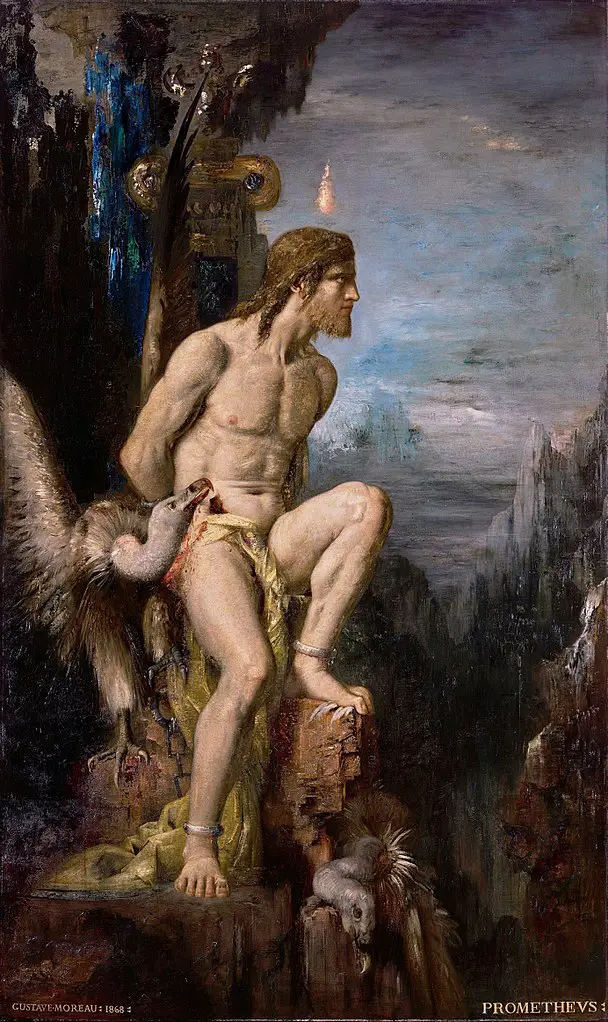
The discovery of fire coincides with the development of the Logos, reasoning, the verb, the word, the intellect and the faculty of reasoning in ancient Greek culture. Prometheus embodies the titan closest to the human condition. Chained to a rock, aware of its transience, but at the same time titan, potentially, on a psychic and imaginative level. Man is always tense between a condition of mortality and immortality, between this world and an altro, thinner.
Kronos, father of Zeus, overthrown and defeated by the same son, is the archetypal element that represents time and the inexorability of its flow, of its turning everything into dust, of its immense and titanic power. Gea represents the earth. Ouranosinstead, it is related to the depths of the sky. Earth, Time and Sky. To bring order to all this, from a condition of primeval chaos, with giants and titans walking the earth, came Zeus, putting an end to "barbarism" and laying the foundations of a new cosmic order on the "logos".
Zeus is angry with Prometheus because he fears humanity's elevation to a divine condition. But, above all, because the titan disobeyed his precise order. Prometheus is the hero who saves humanity from the darkness of the night and the vulnerability of his condition, giving him fire and, at the same time, the reason with which to use it.
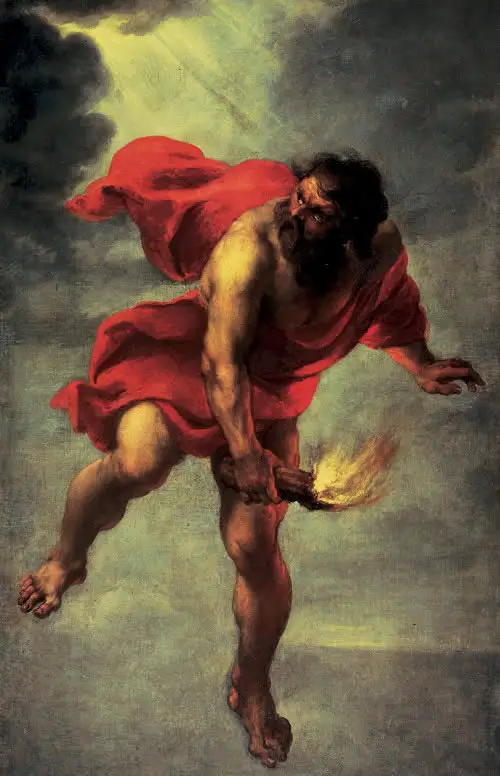
Each mythical example taken from Attic tragedy fulfilled the function of "Catharsis", that is, psychic and spiritual elevation through the horrific vision and terrible of murders, such as Heracles killing his own children, or Medea, granddaughter of Circe, a barbarian witch in the land of Greece, who murdered and repudiated her own lineage, so as not to ensure the husband Jason a descendant.
It is also said that Prometheus had five pairs of twin brothers. At first, the brothers were virtuous and wise, but over time they became entangled with greed. The gods then sent a storm that destroyed their country (in this being able to find remarkable parallels with the Andean tradition of antediluvian humanity, equally "titanic"). Two of these brothers, Atlas and Menezio survived the flood and joined with Cronos and other titans to fight the Olympic gods. Zeus defeated them, sent Menetius into exile and condemned Atlas to carry Heaven on his shoulders for eternity. Prometheus, on his part, sided with Zeus, joining the fight only when it was coming to an end and suggesting to his brother Epimetheus to do the same. As a reward, he had the opportunity to freely access Olympus.
Zeus, for the esteem he placed in Prometheus, gave him the task of forging man. Prometheus fashioned it from mud and animated it with fire. Element that in the myth indicates both the flame as an instrument and the vital energy. The cosmogony and mythology of Hellas are strongly influenced by the influences of the Near East, the Greeks maintained commercial relations with city - states east of the Mediterranean Sea.
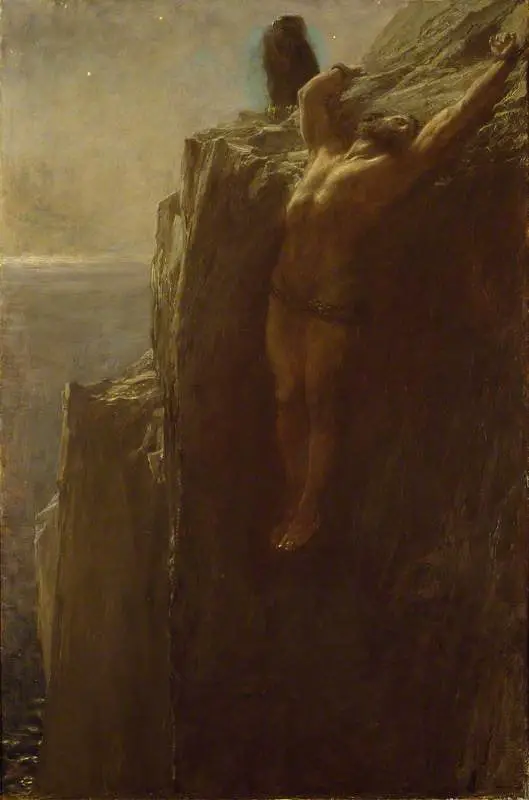
Prometheus gave testimony of the friendship he felt for men from the first time he had to deal with it. When, together with his twin, he received from Athena and the other gods a limited number of "good qualities" to be attributed to living beings, having realized that Epimetheus had distributed the talents in an uneven and unplanned way, to the point that arrived at the human progeny not there were more qualities to assign, Prometheus immediately remedied by stealing a casket in which they were placed from Athena intelligence and memory, which he gave to humans, the only ones to possess them throughout the animal kingdom, as well as fire.
On the one hand, fire represents the Logos, but on the other, Prometheus embodies the wild nature of ancient cosmology, as opposed to the rationalization implemented by the society of the polis on the world outside the Hellenic civilization considered “barbarian” and irrational. The very sense of the tragic is based exactly on the sphere of non-rationality, on the mythical representation of the unconscious shadows of the Greek population of the polis and of man himself. Aristotle when it comes to Poetic writes that tragedy is none other than the evolution of the primitive forms of dithyramb and the songs of phallophoria. In the case of the tragedy the actors increased from two with Aeschylus to three with Sophocles, who introduced the use of scenography, and with the evolution of the tragedy itself the iambic trimeter began to be used. The tragedy derives, according to the Athenian philosopher, directly from the epic:
“Tragedy therefore is the mimesis of a serious and accomplished action in itself, to a certain extent; in a language embellished with various kinds of embellishments, but each in its place in different parts; in dramatic and non-narrative form; which, through a series of cases that arouse pity and terror, has the effect of lift and purify the soul of such passions. I say embellished language what it has rhythm, harmony and song; and I mean various kinds of embellishments but each one in its own place, as in some parts only the verse is used, in others there is also the song). "
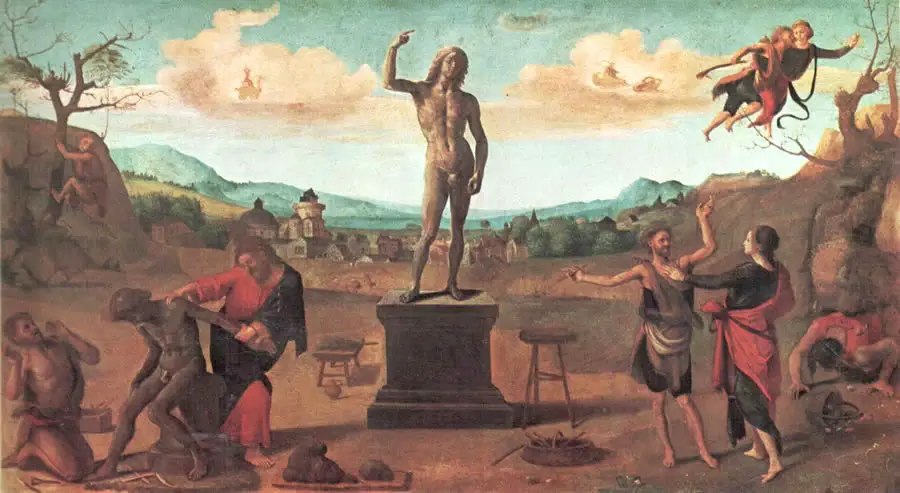
In this definition of tragedy Aristotle introduces the concept of "Catharsis", purification of the soul through the vision of events that arouse irrational emotions in the imagination of the users. The tragic sense for ancient Greek culture is based on irrationality, which finds its application through the explanation of the experience of theatrical representation, and of the “mythos”, the representative story. Ancient Greek tragedy is based on the domestication of irrational emotions, channeled through the imaginative faculty. The epic is strongly characterized by the irrational spirit, embodied in ancient times by the divine and mystical element. In Aeschylus' tragedy, Prometheus represents the titanic courage of earth-bound elemental nature as opposed to the cold rationalization of the "logos". But the same "logos" lives on the irrational, it feeds on the same fear of the unknown, which becomes contemplation of the abyss itself and the desire to know the infinite, sehnsucht, while Prometheus falls, at the end of the tragedy, in Tartarus.
Hermes: "Yet these arrogant gestures made you land on these evils"
Prometheus: "I would not exchange this misfortune with servitude, know it well"
Il Tartar it indicates, in the cosmogony of Hesiod, and in the Greek tradition, a dark and gloomy place, located sometimes "below" and sometimes "on the edge" of the earth. Prometheus, example of hybris, arrogance towards the gods, and earthly natural wisdom, symbol of the element of fire, falls into the abyss, proud, titanic in its decay. The Tragic it becomes what the German Romantics and nineteenth-century philology call Gorgeous, perception of the absolute and the infinite.
